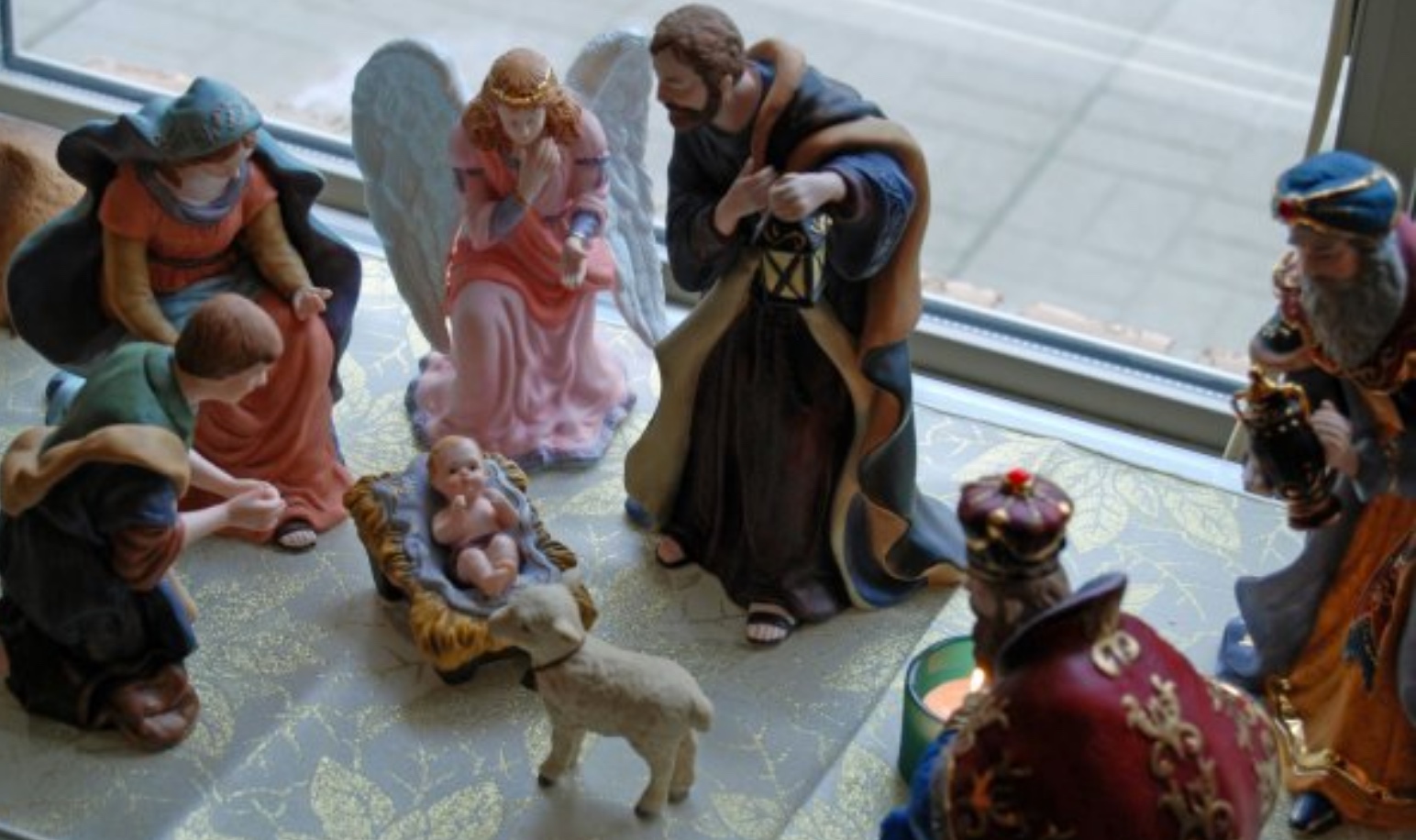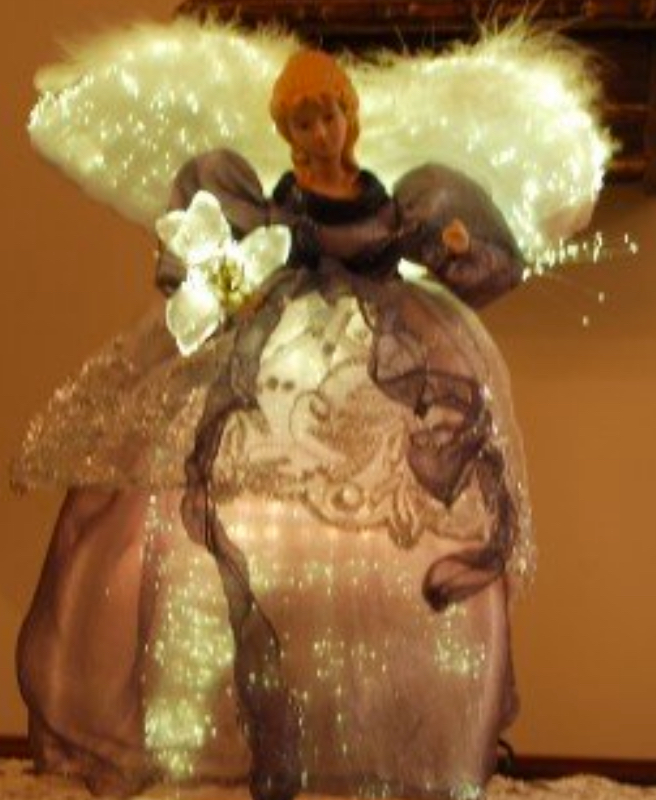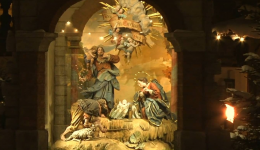Category:
Love Indeed
John 1:14 The Word became flesh and dwelt among us; and we beheld His Glory - the Glory as of the only begotten of the Father, full of grace and truth.
Christians believe that the baby born at Bethlehem whose birth we celebrate each Christmas was God. A little, helpless infant was in fact the Almighty. He was the Word of God. The Creator. The Light and Life of all men and women. He was the eternal Son of God, distinct from the Father.
What are the implications if it is true that the baby born at Bethlehem was indeed God in a human body?
He was not God minus some elements of the deity but God plus all that He had made His own by taking human form to himself. Jesus was and is God and we bow and worship before Him. But why did He become a man? What does incarnation mean; what does it signify as well as actualize?
We read: "The Word became flesh and dwelt among us." The man Jesus of Nazareth living here on earth is a recorded fact that history attests through several ancient sources including the New Testament Gospel narratives, and Jewish and Roman writers, including Josephus. That is (merely?) history; but why did he come to dwell among us? Further, why is it at all important to us today that God – if there be a God, would enter into human experience? Sure, it is marvelous to think about if we are people of faith. It's worth recording, noting and even celebrating. But what are the deep and significant implications for everyone of us, today?
For many, the birth of Jesus which Christians (called 'the incarnation - God coming 'in human form') is just another ancient story even if an ancient wonder like the hanging Gardens of Babylon. But not only was the wonder a miracle back then, it is a continuing miracle with implications for today. For God in human flesh - Jesus, is alive today. And He has claims upon our life.
Jesus lives 'in the hearts' and lives of millions of his followers. His body is the Church: Christ in the world. We live out the life of Christ in our every day on this planet as the Spirit of Jesus who indwells each disciple-Christian enables us. As the Church does Jesus' will, God's will is accomplished. The Church has an answer for the questions: Why did Jesus come and live among us? – Why did the word become flesh and dwell among us? - for Jesus' presence makes a difference in our lives still, and in the lives of all who will respond to him in faith-filled obedience. He brings the kind of life, true living, that He called "abundant." Jesus was made flesh so that God could be with - dwell with, us. Jesus came but he also lingered long enough to know what the totality of human experience is like. He knows about desert experiences, about barren stretches of time, about empty places, dreams and lives, about frustrated hopes. He experienced the aloneness, the unresolved dilemmas, the solutions that have failed and that need solving. He knows, first-hand, suffering and sacrifice, excruciating pain - and the pangs of death.

The word "dwell" literally means "to pitch a tent." When Jesus came to dwell with us, it was as if God came to pitch his tent for a time on our planet. God tabernacled among us. The eternal Word of God in a human body was a similar expression of the Godhead as was implied in the Old Testament Tabernacle: the portable Tent of Meeting that the Jewish people transported in their Exodus journey.
The tabernacle was a place of Glory. We find its significance in the symbols and manifestations of the Glory of God. The Hebrews called it 'the Shekinah.' In the Greek language, the word has similar root meaning and understanding. The Shekinah was the Radiance, Glory, and Presence of God, dwelling among and in the midst of his people. It was symbolized in the Old Testament by the cloud that followed the People of God as they fled from Egypt, a cloud in the day-time which became a pillar of fire in the night. It was 'accompanied' by lightning and earthquake, as in Genesis 29 when the people and Moses were assembled at Mount Sinai to receive the Law of God; there to to be galvanized together into a great Nation. There, Moses talked with God on the mountaintop and when he returned to the people his face shone so brightly that he had to cover it because otherwise nobody could look upon it. (God had already told Moses on the mountain that he would not be able to look directly at God, for that no one could do that and remain alive.) The Shekinah was also symbolized by holy smoke that appeared in the Tent of Meeting (again, which the people carried with them through the Exodus and into the promised land of Canaan). And then later, the Shekinah came into the Temple of Israel at Jerusalem, in that more permanent form where God was pleased to dwell with His People for a season: in the Temple's Holy Place and inside more specifically: the Holy of Holies.
St. John writes in the prologue of His New Testament Gospel, that this Shekinah glory of God, which had found its last expression in the Tabernacle of the People of God, is now found in the body, the person and life - in that 'tabernacle' that is Jesus. And this is not mere hearsay, John is saying, for "we beheld His Glory – the Glory of the Only Begotten of the Father, full of grace and truth."
We recall that John, with two of Jesus other disciples Peter and James, had the privilege of accompanying the Lord into a mountain one day where they saw him speak with Moses (symbolizing 'the Law' or the Pentateuch) and Elijah (symbolizing all of the prophets of Israel), saw Him transfigured before them. Gospel writer Matthew's record of this event, in chapter 17: 2, says that Christ was "transfigured before them and his face shone as the sun and his raiment was white as the light."

There is mystery here.
The Tabernacle was a place of meeting. Here the people met to worship, to sacrifice their offerings, and to learn the ways of God for His people and for His world. God met with His people there, in that holy place. It was not their idea; for since the mess-up in Eden Garden, we sons and daughters of Adam and Eve have been running whenever God comes near, as He seeks to talk, to commune and be with us. We run or we hide perhaps because like Adam of old we feel guilty too, for we know we've failed in our actions and thoughts; deliberately gone away from God and out and on to our own way. But God keeps coming to us, seeking us; keeps taking the initiative. He deigns to meet with us still. And so, in the incarnation story God once more took the initiative and came down to us. 'Came down' in all sorts of ways. God sends a gift – His Son. He initiates and effects the reconciliation necessary between God's Self and every fallen human being. He can do it this day, in your life and mine.
When John writes in verse 1, "The glory as of the only begotten of the Father," he does not mean some kind of reflected glory. In prophets and saints of old, we there was indeed some of the reflected Glory of God, and even as revealed in some good Christian folk through history and today. But, the difference between that reflection of God and Christ (who is and actually reveals the glory) of God is like the difference between the moon and the sun – for one has the glory of reflected light while the other is the light itself.
In Jesus Christ God came near to us and through Jesus Christ we may draw near to God. It's futile to try to get close to God via our own efforts, without any bridge. But we need this Mediator, Someone between God and a human. And Jesus is the only Mediator ultimately, between us and God, who can bring us and link us to God and us to God. In Jesus alone Heavens Love and Heaven's Justice meet. Through Christ we have access by one Spirit unto the Father.
(It is true to note, biblically, that we also can be 'bridges' or priests (pons, pontiff) - not just one of us, but many of us who believe; as we prayerfully intercede for our neighbour, as we share and help and serve. But ultimately the true Mediator, who alone connects God to man and vice versa, is Jesus Himself. So as we pray and and as we seek to serve, we do it 'in Jesus' Name. Otherwise, we'll simply not 'get through.')
God came in the flesh. And we maynow receive Him or not. For all who will, and do, God gives the power (and the authority) to become and to be called God's sons and daughters, the children of God. Until then, we remain unfit, unholy, unlovely and thereby unacceptable to God - but still loved by God. But we are made acceptable and granted access through that One Who once knew a stable in Bethlehem of Judea. Not only is it a marvel of nature, this Christmas story – much more, it is a wonder of grace.

The tabernacle was a place of sacrifice. There, the priests daily made intercession for the sins of the people through the shedding of the blood of animals on an altar of sacrifice. This was done to point ahead and fore-shadow the final sacrifice, once-for-all sacrifice of Jesus on Calvary's Cross whereby God once-and-for-all put away the sin of the world.
Christ is our Passover. God passes over us because of the blood of Christ sprinkled not on ancient doors of Egypt but on the cross of Calvary. He came to bear our sins in the tabernacle of his own pure body. His body was pierced, hit upon, so badly marred – and it was for you and for me. Centuries before, prophet Isaiah wrote, we believe, of this: "The chastisement of our peace was upon him; and with his stripes we are healed."
His life was a life of sacrifice from start to finish. In His coming, He humbled himself, emptied himself of the glory that was due to him as God, he took our form (see Phillippians 2:1-16). He went even lower than that, for He became a servant. He took the punishment that was due us upon Himself. That is the story of Christmas as much as it is the story of Easter. God became man but it was so we might see his glory, the very glory of God. It was so you and I might come to meet the One whom we so naturally run from and refuse to seek; so we might not have to suffer for our sins.
At Sinai, where God's presence and glory was first shown to Israel as a nation, the people could not come near to the holy mount lest they die. Moses had to cover his own face, so brightly did it shine after he had met with God. In Israel's history, a man reached out and touched the ark of God, which symbolized God's presence and glory, and the man died. A priest of Israel might enter the holy of holies - but only once a year (on Yom Kippur, the most holy day: the day of atonement).
And yet Jesus who was God himself, Emmanuel [literally: 'God with us'], was born in squalor, come to live among sinful humans, to eat what they ate and live like they lived, but did not even have a place to call home . . . died and everything – and he was the very Shekinah glory of God! Not all, but a few, like John (and maybe you and I?), caught a glimpse of this, tried as best to take it all it in - but who can, fully? No wonder at the promise of the birth on that first Christmas Eve, the angels sang Shekinah!: "Glory to God in the highest!"
What a remarkable thing is the incarnation. The incarnate Word was God's love revealed - Love in action.
Talk can be cheap; the doing is what counts.








